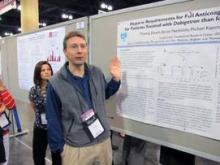SAN JUAN, P.R. – The new oral anticoagulant dabigatran is the cardiologist’s darling but the intensivist’s headache and the trauma surgeon’s nightmare, suggested investigators here.
Dabigatran (Pradaxa) is a direct thrombin inhibitor approved in the United States for the reduction of risk from stroke and systemic embolism in patients with nonvalvular atrial fibrillation. Unlike Coumadin/warfarin, dabigatran’s effects are not reversible.
Pharmacists at the Scripps Mercy Hospital in San Diego evaluated prescribing patterns for dabigatran among patients in their hospital and found that 13% received it for off-label indications, a practice that has the potential for patient harm, they said at the annual meeting of the Society of Critical Care Medicine.
Of 38 patients prescribed dabigatran during their hospital stay, 33 received it for the Food and Drug Administration–approved indication but 5 (13%) received it for other, unspecified indications, reported Dr. Trevor Perry and Dr. Harminder Sikand, both clinical pharmacists at Scripps. "Prescribing was equally divided between house staff, hospitalists, and cardiologists," researchers reported (Crit. Care Med. 2012 [doi:10.1097/01.ccm.0000424500.73199.04]).
The incidence of gastrointestinal bleeding with the drug in their study was 10.5%, higher than the 6.1% rate for any gastrointestinal bleeding stated in the package insert, Dr. Perry said in an interview.
In addition, pharmacists needed to correct the dabigatran dose in 24% of patients, and dabigatran had noticeable effects on clotting parameters, with 74% of patients having an activated partial thromboplastin time (aPTT) above the upper limit of normal, and 64% of patients having an international normalized ratio (INR) above the upper limit.
This finding suggests that in these patients, the clotting assays "may be useful to determine medication adherence but not to determine the level of anticoagulation," the authors wrote in a poster presentation.
"Clinicians need to be aware of the appropriate indication for use and renal dosing of dabigatran to prevent patient harm, as only 87% of patients were prescribed dabigatran for the FDA-labeled indication," they noted.
Major heparin boost needed
In a separate study, Dr. Thomas Edrich from the department of anesthesiology, perioperative and pain medicine at Brigham & Women’s Hospital in Boston and his colleagues found that for patients scheduled for catheter-based atrial ablation procedures, those who were on dabigatran required an approximately 50% greater dose of heparin to achieve full anticoagulation for the procedure than did patients on warfarin (Crit. Care Med. 2012 [doi:10.1097/01.ccm.0000425177.10736.a4]).
Patients who had been on warfarin until 12 hours before the procedure required about 3,000-4,000 IU of heparin/hr to achieve an activated clotting time of 350 seconds, compared with about 6,500-9,000 IU/hr in patients on dabigatran, Dr. Edrich said. They studied retrospective data for 36 patients on dabigatran, 100 patients on warfarin (53 with an INR above 2.0), and 29 patients on no anticoagulation.
"The interesting finding here is that if you’ve been on dabigatran, you’re going to need twice as much heparin," he said in a poster discussion session.
Patients like it, surgeons don’t
Although patients like the convenience of oral dosing without the need for regular INR monitoring with the new anticoagulants, often they are not told that convenience may come at a very high price if there is no effective therapy to reverse the anticoagulation effect, commented Dr. Christine Toevs, a critical care surgeon at the West Penn Allegheny Health System in Pittsburgh.
"The problem is that patients aren\'t informed enough to make that choice. They understand that they’re not getting their labs drawn once a week or twice a week, and they understand that’s not a cost that they are paying. But if they fall and they have a head injury, that is a life lost, and we cannot stop it," she said during a debate on the costs of new medications.
Dr. Perry’s and Dr. Edrich’s studies were internally funded; they reported having no financial disclosures. Dr. Toevs reported having no financial disclosures.

